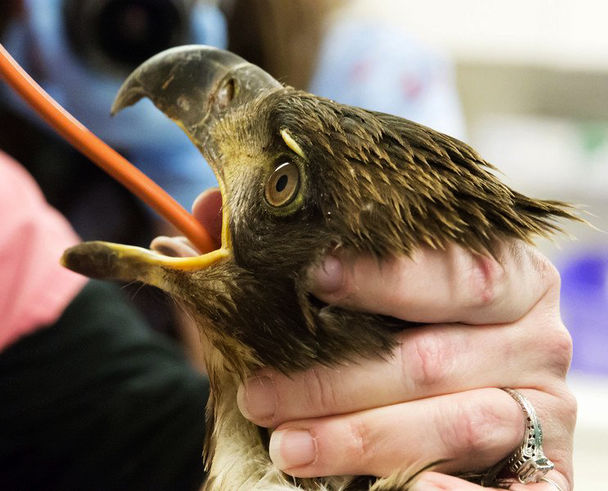Seven eagles poisoned nearly to death after feeding on carcasses of euthanized horses in Lewis County should be well enough for release from wildlife shelters this week.
By Lynda V. Mapes, The Seattle Times

Seven eagles poisoned nearly to death after feeding on euthanized horse carcasses are expected to be released this week.
The eagles are alert, getting feisty and are being moved to outdoor cages, said Mike Pratt, wildlife director at the West Sound Wildlife Shelter on Bainbridge Island, which cared for six of the eagles. The shelter, funded by donations, takes in wild animals of all sorts that have been injured or orphaned.
The shelter started getting calls over the weekend about first one eagle, then a second found nearly dead on private property in Winlock, Lewis County. By the time shelter staffers arrived to pick up the birds on Sunday, four more had become sick, Pratt said. The six birds — five juveniles and an adult — were so ill they were convulsing, vomiting, and could not stand. Two were comatose.
Back at the shelter, volunteers and two veterinarians were waiting. They administered a charcoal purgative around the clock and, by Tuesday morning, even the sickest birds had revived. They may be released by the end of the week, right back where they came from, Pratt said.
A seventh poisoned eagle had been taken to the wildlife shelter at the Audubon Society of Portland on Friday. That eagle, a first-year male, looks excellent and will be released Wednesday, said Lacy Campbell, operations manager at the wildlife center.
Meanwhile, the U.S. Fish and Wildlife Service is investigating the incident, said spokeswoman Joan Jewett. It is a federal offense to poison an eagle, even accidentally.
It all started with horses, euthanized and left by their owner in a field, said Jewett, who added that the carcasses have since been buried.
Stephanie Estrella, director and wildlife rehabilitator of Raindancer Wild Bird Rescue in Olympia, which cared for the birds before the larger Bainbridge shelter could come collect them, said this was the first time she had encountered raptors poisoned by tainted carcasses.
Most of the raptors she has cared for were victims of car strikes, or torn up in fights with other raptors.
She got the first call from Sharon Thomas, a Winlock resident who saw an eagle acting strangely in a field in front of her house.
“It flopped and flew, and flopped and flew. It crashed several times,” Thomas said. “Then it came right to me, it sat right at my feet as if it had come for help.”
Thomas took the eagle to her house, put it in a kennel, took photos of it, and put them on Facebook asking for help. Ultimately, it was Estrella from Raindancer who came to collect the eagle.
Little did Thomas know she was in for a long weekend of more of the same, as she and her neighbors walked and drove the area, on the alert for more animals in distress. “It was heart-wrenching,” Thomas said. “Seeing a large, majestic bird falling over on its head is very sad. Picking them up, seeing them unresponsive and lethargic. Picking up the two others that seemed dead, their eyes were not open, they were barely breathing.”
Eventually, she and the neighbors walking the field and thickets found two horse carcasses, with eagles feeding on them. “I picked an adult off one of the horses. He was covered in rotten meat and blood and so was I,” Thomas said.
She and other neighbors collected six sick eagles, and drove off others trying to feed on the carcasses. “It was very hard to drive away from the work Monday morning,” Thomas said. “I don’t know what other wildlife may have been affected.”
The Longview Daily News reported Monday that the horses’ owner, Debra Dwelly, said she had no idea she had created a hazard until federal wildlife agents, alerted by the animal-shelter operators to the eagles’ plight, showed up at her home on Sunday, after cruising the area in a small plane and spotting the carcasses.
Dwelly told the Daily News the poisoning was an honest mistake that occurred because a friend’s backhoe had broken down, delaying burial of the horses she had put down earlier last week.
Washington state law requires the owners of animals or owners of land on which animal carcasses are found to bury or incinerate carcasses within 72 hours so they do not become a hazard.
Attempts by The Seattle Times to reach Dwelly were unsuccessful Tuesday.
Meanwhile, all seven eagles were getting stronger by the hour. Thomas said she is eager to seeing them released.
“I look forward to them returning and behaving as an eagle should,” Thomas said. “They should be aggressive. You shouldn’t be holding them in your arms.”
